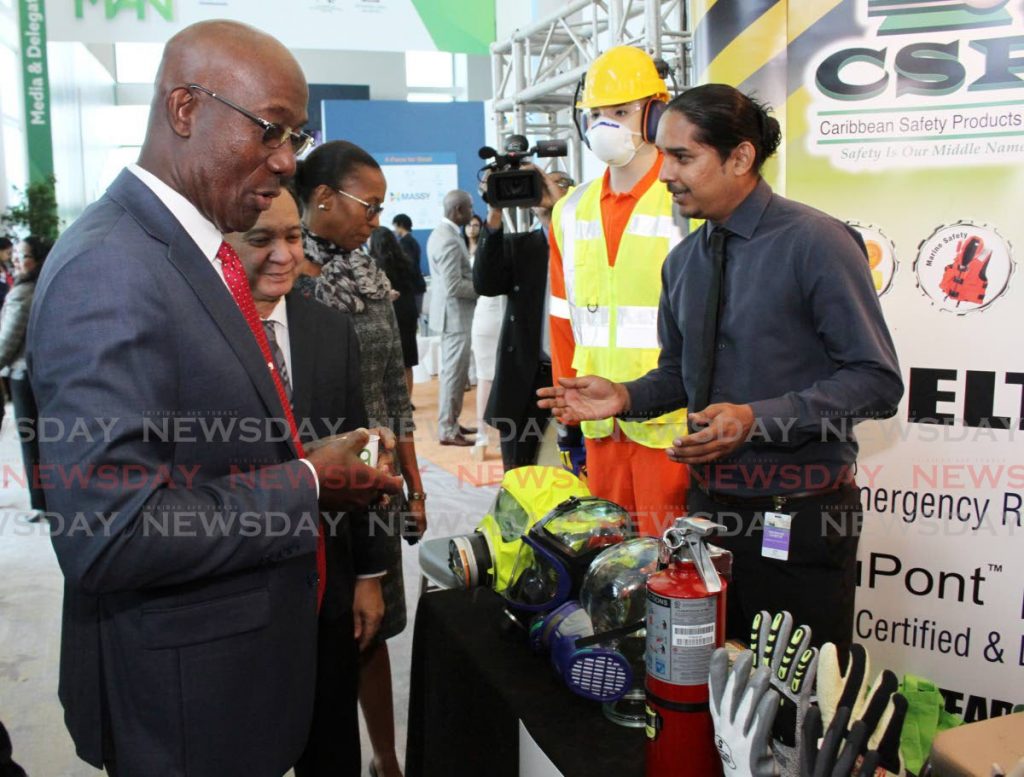DRAGON CAGED

The Dragon deal, a US$1 billion natural-gas-sharing arrangement between TT and Venezuela, is on hold.
The reason, the Prime Minister said in his keynote address at the 2020 Energy Conference at the Hyatt Regency, Port of Spain, is US economic sanctions against the South American country.
TT and Venezuela signed a government-to-government agreement, to much fanfare, in August 2018, as well as a term sheet agreement between the commercial partners, energy giant Shell, Venezuela’s state oil company PDVSA, and TT’s National Gas Company (NGC).
Since then, the details of the commercial agreement were being hammered out, with hopes for first gas as early as next year.
Dr Rowley expressed regret that the deal was on hold, but added, “At a moment’s notice we are ready to move ahead with the project on the lifting of such restrictions.”
The agreement would have seen gas from Venezuela’s Dragon Field – about 150 million standard cubic feet a day – imported through a billion-dollar pipeline to the Hibiscus Gas Platform off the northwest coast of TT. The platform is jointly owned by TT government, the National Gas Company (NGC) and Shell.
The deal would have resulted in a boost in TT’s gas supply, as government aimed to expand domestic gas production by 4.14 Bcf/d (billion cubic feet per day) by next year. It would also have been used to develop more petrochemical products ,which include everything from plastics and rubber to detergents and pesticides.
Access to Dragon Field gas is not the only thing being hindered by the US sanctions against the Venezuelan government. Talks between TT and Venezuela to jointly develop the Loran-Manatee gas field, which sits on the TT/Venezuela maritime border, were also impeded.
Rowley said it came at a great cost to oil and gas giant Shell, which has a 60 per cent interest in the field.
Because of the sanctions, which prohibit US-based companies from doing business with Venezuela, both TT and Venezuela were forced to end talks to jointly develop the field. Shell did not immediately respond to a request for comment.
Each government agreed to develop the field on the Loran-Manatee border independently. Shell is the operator for the whole field, which has approximately 10 trillion cubic feet of gas, 25 per cent of which is within TT waters (Manatee).
Rowley called the Manatee initiative “the single most significant development in the energy sector in recent times.” He said the policy shift would free up investment and development of the field and provide easy access to the market for gas.
“This has implications for development for other cross-border fields, such as the Manakin-Cocuina and Kapok-Dorado, which collectively have an estimated 850 billion cubic feet of natural gas within the TT maritime area. The achievement of this agreement is a reflection of positive initiatives being undertaken by Government to meet domestic gas requirements for competitive energy, and our retention of a place in the petrochemical and LNG business for some considerable time to come.”
Rowley said Shell is in conversation with the Government and is working on various development scenarios to determine the best option.
Speaking regionally, Rowley said the recent successes in discoveries were contributing to changing the perception that the Caribbean is an energy-deficient region because of a perceived lack of hydrocarbon resources.
He said the Caribbean once depended on oil and gas imports, since before 2015, only TT, Barbados and Cuba were known to have reserves of oil and gas.
While the region still struggles with energy, with some countries paying US$0.20 and US$0.37 per kilowatt per hour (TT has some of the lowest rates in the region, at US$0.06), Rowley said Caribbean countries have begun to embrace the idea of renewable energy. The region, he said, has untapped potential for renewable energy, which if if harnessed, would displace approximately 2.7 million barrels of oil per year and save Caribbean countries US$5.0 billion in fuel imports annually.
Rowley also pointed out the potential for deep water exploration for hydrocarbons, as only 31 per cent of deep-water areas have been explored. He announced an upcoming deepwater bid-round for 2020/2021.
“The (Energy Ministry) has been acquiring extensive seismic data over the deepwater area to facilitate meaningful evaluation of the deepwater blocks.”
Rowley also extended a hand to Caribbean countries wanting to capitalise on the new-found interest in Caribbean gas and oil prospects after the successes in exploration for oil and gas in Guyana. Thanks to the new discoveries, he said, Guyana is even being hailed as the next major oil and gas province.
The Prime Minister also boasted of TT’s ability to manage oil production, noting that state oil producer Heritage Petroleum Ltd earned $884 million in after-tax earnings (unaudited statements) and Paria Fuel Trading Co Ltd earned $172 million for the same period.

Comments
"DRAGON CAGED"